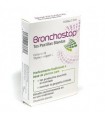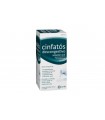Bronchogrip contains the following active substances:
- Paracetamol, which relieves pain (analgesic) and is effective against pain and discomfort, including headache and sore throat, and also helps reduce temperature if you have a fever (antipyretic).
- Guaifenesin, which is an expectorant to help fluidize mucus (phlegm) when you have a productive cough.
- Phenylephrine hydrochloride, which is a decongestant used to reduce inflammation of the nasal passages, thus facilitating breathing.
Bronchogrip is used for short-term relief of cold and flu symptoms, including aches and pains, such as headache, sore throat, nasal congestion, chills and fever. It fluidifies persistent mucus (phlegm) and provides relief against productive coughing in adults and children 15 years of age or older.
ACTION AND MECHANISM
- Combination of a [ANALGESIC] [ANTIPYRETIC], a [HISTAMINERGICAL ANTAGONIST (H-1)] and a [NASO/FARINGEO DECONGESTANT]. Acetaminophen exerts analgesic and antipyretic effects probably due to inhibition of prostaglandin synthesis at the central level. Phenylephrine, on the other hand, is an alpha-1 adrenergic agonist, which results in vasoconstriction, reducing nasal congestion. Finally, chlorphenamine antagonizes H1 and cholinergic receptors, eliminating catarral symptoms such as sneezing, whining or rhinorrhea.
SPECIAL WARNINGS
- In patients treated with anticoagulants, short treatments with low doses are recommended, monitoring coagulation parameters.
- Haematological counts are recommended in patients treated with high doses or for extended periods of time.
- It is advisable to monitor transaminase levels in patients with prolonged treatments or at risk of hepatotoxicity.
- In case of overdose, the specific antidote to acetaminophen is N-acetylcysteine.
Elderly
Elderly patients may be more susceptible to the side effects of this medicine, so it is recommended to use it with caution, and discontinue administration if adverse reactions are not tolerable.
PATIENT ADVICE
- It is advisable to drink plenty of water during treatment, avoiding as much as possible the intake of alcoholic beverages.
- It is recommended not to exceed the recommended daily doses and avoid treatments longer than ten days without an optional prescription.
- If symptoms continue or worsen after five days, it is recommended to consult your doctor.
- The doctor or pharmacist should be notified of any illness suffered by the patient or any medicine he or she is taking.
- May cause drowsiness, so it is recommended to exercise caution when driving, and not combine it with drugs or other sedative substances such as alcohol.
Contraindications
- Hypersensitivity to any component of the medicine, including cases of [ALLERGY TO PARACETAMOL].
- [HEPATOPATIA], such as severe hepatic impairment or [HEPATITIS]. Acetaminophen can lead to hepatotoxicity.
- Severe renal failure.
- [PORFIRIA]. H1 antihistamines are not considered safe in these patients.
- Severe heart disease or uncontrolled diabetes mellitus. There is a risk of severe decompensation.
- [ARTERIAL HYPERTENSION].
- [HYPERTHYROIDISM]
- [TAQUICARDIA]
- Patients in treatments with IMAO antidepressants within 14 days before initiating phenylephrine therapy (see Interactions).
DRIVING EFFECTS
This medicine may substantially affect the ability to drive and/or operate machinery. Patients should avoid handling hazardous machinery, including automobiles, until they are reasonably certain that drug treatment does not adversely affect them.
Pregnancy
Some active substances in this specialty are able to cross the placental barrier. The safety and efficacy of this medicinal product in pregnant women have not been evaluated, so it is recommended to avoid administration unless there are no safer therapeutic alternatives, and provided that the benefits outweigh the potential risks.
Indications
- Symptomatic relief of [COMMON COLD] and [GRIPE] that cause fever, mild or moderate pain and nasal congestion.
Interactions
- Ethyl alcohol. Ethyl alcohol may enhance the sedative effects of this medicine. In addition, intake of alcoholic beverages along with acetaminophen may cause liver damage. It is recommended to avoid alcohol intake during treatment. In chronic alcoholics, no more than 2 g/24 hours of acetaminophen should be administered.
- Alpha blockers (anti-migraine ergotamines, oxytocin). Simultaneous use is not recommended because an increase in vasoconstrictor effects may occur. Alpha antihypertensive blockers or benign prostate hyperplasia, by not blocking beta receptors can cause an increased risk of hypotension and tachycardia.
- Inhaled anesthetics (halotane). They may increase the risk of arrhythmias.
- Oral anticoagulants. In very rare cases, usually at high doses, anticoagulant effects could be potentiated by inhibiting hepatic synthesis of coagulation factors by acetaminophen. It is recommended to administer the minimum dose, with as short a duration of treatment as possible, and to monitor the INR.
- Anticholinergics (antiparkinsonians, tricyclic antidepressants, IMAO, neuroleptics). Chlorphenamine could potentiate anticholinergic effects, so it is recommended to avoid association.
- Oral contraceptives. They could increase plasma clearance of acetaminophen, decreasing its effects.
- Tricyclic antidepressants (amitriptyline, amoxapine, clomipramine, desipramine, doxepine, maprotyline). Its simultaneous use may enhance the imprisoning effects of phenylephrine.
- Antihypertensives (beta blockers, diuretics, guanetidine, methyldopa). Phenylephrine could antagonize antihypertensive effects, and even lead to hypertensive seizures, so it is recommended to monitor blood pressure. Propranolol could inhibit the metabolism of acetaminophen, leading to toxic effects.
- Atropine. It blocks reflex bradycardia caused by phenylephrine and increases the presora response to phenylephrine.
- Active coal. It can produce an adsorption of acetaminophen, decreasing its absorption and pharmacological effects.
- Chloanfenicol. The toxicity of chloanphenicol could be enhanced, probably by inhibiting its metabolism.
- Digital. The risk of phenylephrine-associated cardiac arrhythmias may be increased.
- Diuretics that can cause hypokalaemia (furosemide). Hypokalemia may be potentiate and can decrease arterial sensitivity to vasopressors such as phenylephrine.
- Nervous stimulants (amphetamines, cocaine, xanthines). Nerve stimulation could be enhanced, resulting in intense excitability.
- Thyroid hormones. An enhanced effects of both drugs may occur, with a risk of high blood pressure and coronary insufficiency.
- IMAO. IMAO could potentiate the effects of phenylephrine by inhibiting norepinephrine metabolism, increasing the risk of hypertensive seizures and other cardiac phenomena. It is recommended to avoid administration of this medicine in patients treated with IMAO within 14 days prior.
- Enzyme inductors. Medications such as barbiturates, carbamazepine, hydantoin, isoniazide, rifampicin or sulfinpirazone could induce acetaminophen metabolism, decreasing its effects and increasing the risk of hepatotoxicity.
- Lamotrigin. Acetaminophen could reduce serum concentrations of lamotrigin, resulting in a decrease in the therapeutic effect.
- Levodopa. Administration of levodopa together with sympathomimetics increases the risk of cardiac arrhythmias, so a decrease in the dose of the adrenergic agonist may be necessary.
- Metoclopramide and domperidone. They increase the absorption of acetaminophen in the small intestine, by the effect of these medications on gastric emptying.
- Probenecid. Increases the plasma half-life of acetaminophen by decreasing the degradation and urinary excretion of its metabolites.
- Ion exchange resins (cholestyramine). Decreased absorption of acetaminophen, with possible inhibition of its effect, by fixing acetaminophen in the intestine.
- Nitrates. Phenylephrine could antagonize the anti-anminous effects of nitrates, so it is recommended to avoid association.
- Sedatives (opioid analgesics, barbiturates, benzodiazepines, antipsychotics). Sedative effects could be enhanced.
- Sympathomimetics. A boost of side effects, both nervous and cardiovascular, can occur.
- Zidovudine. Although possible enhancing of zidovudine toxicity (neutropenia, hepatotoxicity) has been reported in isolated patients, there does not appear to be any kinetic interaction between the two medicinal products.
Breast feeding
Some of the active substances in this medicine are excreted with milk, so it is recommended to discontinue breastfeeding or avoid the use of this medicine in pregnant women.
RULES FOR PROPER ADMINISTRATION
Dissolve the contents of an envelope in half a glass of hot water (not boiling). Leave to cool and drink when a drinkable temperature is reached.
Dosage
Adults, the elderly and children from 15 years of age: 1 over/6 h, if necessary. Maximum dose: 4 envelopes/day.
- Children and adolescents under 15 years of age: Do not administer, except under medical supervision.
If symptoms persist for more than 3 days evaluate the clinical situation.
POSOLOGY IN HEPATIC IMPAIRMENT
Do not administer in severe hepatic impairment.
POSOLOGY IN RENAL INSUFFICIENCY
Do not administer in severe renal impairment.
Precautions
- [RENAL INSUFFICIENCY]. Accumulation of the active substances may occur. Renal adverse reactions to acetaminophen are more common in these patients.
- Patients with [DIABETES], [GLAUCOMA], [CORONARY INSUFFICIENCY], [ISQUEMIC CARDIOPATIA], [ARTERIAL HYPERTENSION], [CARDIAC ARRHYTHMIA], [HYPERTHYROIDISM], [FEOCROMOCITOMA], [PROSTATIC HYPERPLASIA] or [URINARY BLADDER OBSTRUCTION], [MYASTHENIA GRAVE], [PEPTICA ULCER] or [INTESTINAL OBSTRUCTION]. Both phenylephrine and chlorphenamine could aggravate symptoms. In severe cases, it may be advisable to avoid administration.
- [ASMA], [PULMONARY EMPHYSEMA] or [CHRONOTIC OBSTRUCTIVE PULMONARY DISEASE]. Chlorphenamine could worsen these processes due to its anticholinergic effects. Bronchospastic reactions have been reported when administering acetaminophen to asthmatic patients with [SALICILATOS ALLERGY], so special caution is recommended in these patients.
- [EPILEPSIA]. Some H1 antihistamines have been associated with seizures.
- [SANGUINEAS DISCRASIAS]. Acetaminophen may sometimes result in [ANAEMIA], [LEUCOPENIA] or [TROMBOCITOPENIA]. Extreme precautions are recommended, avoiding prolonged treatments, and periodic haematological counts in these cases.
- [HEPATICA INSUFFICIENCY], Hepatotoxicity. Acetaminophen metabolism could lead to hepatotoxic substances. It is recommended to avoid use in patients with prior liver damage (see Contraindications), as well as extreme precautions in those with [CRONICO ALCOHOLISM] or other factors that could trigger hepatotoxicity phenomena. It is advisable to avoid prolonged treatments and not exceed doses of 2 g/24 hours in these patients. Similarly, it is recommended to monitor transaminase levels, discontinuing treatment in the event of a significant increase in transaminase levels.
EXCIPIENT PRECAUTIONS
- This medicine contains aspartame as an excipient, so it should be taken into account by those affected by [FENILCETONURIA]. 100 mg aspartame corresponds to 56.13 mg phenylalanine.
ADVERSE REACTIONS
The adverse reactions described are:
- Digestives. Anticholinergic phenomena such as [MOUTH DRYNESS] and [STRESS] may occur. The rarest is the appearance of [ANOREXIA].
- Hepatic. Occasionally [HEPATOPATIA] may occur with or without [ICTERICIA].
- Cardiovascular. [ARTERIAL HYPERTENSION], [TAQUICARDIA].
- Neurological/psychological. Sometimes [SOMNOLENCIA], [CONFUSION] mentally and [EUFORIA] may appear. The occurrence of [EXCITABILITY] phenomena, with [NERVIOSISMO] and [INSOMNIO], is very rare, being especially common in children and the elderly.
- Genitourinarias. [URINARY RETENTION].
- Allergic/dermatological. Rarely [HYPERSENSITIVITY REACTIONS], with [DERMATITIS], [EXANTEMATIC ERUPTIONS], [PHOTOSENSITIVITY REACTIONS] and [HYPERHIDROSIS].
- Ophthalmological. [MIDRIASIS], [BLURRED VISION], [EYE HYPERTENSION].
- Blood. [ANAEMIA], [HEMOLITICA ANAEMIA], [LEUCOPENIA] with [NEUTROPENIA] or [GRANULOCITOPENIA], and [TROMBOCITOPENIA].
- Metabolic. Rarely [HIPOGLUCEMIA].
Overdose
Symptoms: Overdose by acetaminophen products is very serious and potentially fatal poisoning. Symptoms may not develop immediately, and may even take up to three days to appear. These symptoms include confusion, excitability, restlessness, nervousness and irritability, dizziness, nausea and vomiting, loss of appetite and liver damage. Hepatotoxicity usually develops after 48-72 hours with nausea, vomiting, anorexia, discomfort, diaphoresis, jaundice, abdominal pain, diarrhea and liver failure.
In children there are also states of sopor and alterations in the way of walking.
In the most severe cases, the patient may die from hepatic necrosis or acute renal impairment.
The minimum toxic dose of acetaminophen is 6 g in adults and 100 mg/kg in children. Doses greater than 20-25 g of acetaminophen are potentially fatal.
In addition to symptoms of acetaminophen overdose, symptoms of chlorphenamine overdose (deep sedation, anticholinergic symptoms) and phenylephrine (excitability, seizures, tachycardia, high blood pressure) may occur.
Treatment: In case of overdose, you should go to a medical center immediately, as acetaminophen poisoning can be fatal, even if no symptoms appear. Early identification of acetaminophen overdose due to the severity of the picture, as well as possible treatment, is especially important in children.
In any case, gastric lavage and aspiration of stomach contents will be initially carried out, preferably within four hours of ingestion. Administration of active coal can reduce the amount absorbed.
There is a specific antidote in case of acetaminophen poisoning, N-acetylcysteine. It is recommended to administer a dose of 300 mg/kg N-acetylcysteine, equivalent to 1.5 ml/kg of 20% aqueous solution, with a pH of 6.5, intravenously, over a period of 20 hours and 15 minutes, according to the following scheme:
- Adults. A shock dose with 150 mg/kg (0.75 ml/kg solution at 20%) will initially be administered intravenously, for 15 minutes, either directly or diluted in 200 ml of 5% dextrose.
A maintenance dose with 50 mg/kg (0.25 ml/kg solution at 20%) will then be established. 500 ml of 5% dextrose in slow intravenous infusion for 4 hours.
Finally 100 mg/kg (0.50 ml/kg solution at 20%) 1000 ml of 5% dextrose in slow intravenous infusion for 20 hours.
- Children. The same amounts per unit weight as in the adult shall be administered, but dextrose volumes should be adjusted based on the child's age and weight in order to avoid vascular congestion.
The effectiveness of the antidote is maximum if administered within 8 hours of ingestion. Effectiveness decreases progressively thereafter and is ineffective from 15 hours.
Administration of N-acetylcysteine at 20% may be discontinued when blood acetaminophen levels are less than 200 mcg/ml.
In addition to the administration of the antidote, symptomatic treatment will be instituted, keeping the patient under clinical surveillance.
In the event of hepatotoxicity, it is recommended to conduct a liver function study and repeat the study at 24-hour intervals.




































